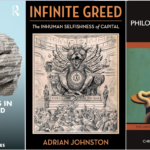News – July 2022
20% off and free global shipping on all Routledge titles for LacanOnline.com readers. Use this link and code S031 at the checkout.
Registration is now open for the Lacan: Clinic and Culture Conference taking place at Duquesne University, Pittsburgh, October 14-16. Hosting some of the world’s foremost experts on Lacanian psychoanalysis, the conference will explore the applicability of Lacanian thought and practice in today’s clinic, culture, and their intersection. To highlight the field’s accessibility and relevance, a series of educational seminars and workshops re-visiting, critiquing, and applying key concepts will also be offered. Abstracts of the keynote and special topics presentations are on the conference site, and a series of Clinical Workshops are also planned, which will be open to PhD psychology students, trainee clinicians, practicing psychotherapists/psychoanalysts, and clinical supervisors. There are also three pre-conference online presentations given by Darian Leader, Linette Park, and Adrian Johnston respectively. These are booked separately so can be attended in addition to the conference, or without the conference. Register now for these, and for the conference, here.
Jacques-Alain Miller’s interview with Oscar Razani, first published on Argentina’s Pagina12 earlier this month, is available in English translation courtesy of the NLS. Read it here. The interview contains some interesting remarks about the un-transmissibility of psychoanalysis, the reasons for the open-armed reception of Lacan’s work in South America, and why Lacan thought the super-rich are unanalysable. The interview marks the publication of Lacan Hispano, a 500-page volume edited by Alejandra Glaze which features more than 70 analysts’ contributions on the reception of Lacanian psychoanalysis in the Hispanic world. Spanish speakers can also watch a presentation of the book by Miller on YouTube.
Slavoj Žižek’s latest, Surplus-Enjoyment: A Guide for the Non-Perplexed has just been released by Bloomsbury. Perhaps more so than some of his recent work, it contains a sustained commentary on Lacan’s – and Lacanian – thinking on the nature of excess and surplus-enjoyment (what Lacan calls plus-de-jouir), running from the heritage of the idea which Lacan finds in Marx, to the development of his own notion of object a. Zizek’s book can also be read in the light of recent work of other authors to whom he acknowledges a debt: among others, Gabriel Tupinamba’s critique of the ideological limitations of Lacanians and Lacan himself; Kohei Saito’s research on the role of ecology in Marxism; and Saroj Giri’s reading of the Lacanian idea of subjective destitution as a political category.
Miguel de Beistegui’s Lacan: A Genealogy was published at the end of July by Bloomsbury. Beginning his genealogical account at the end of the 18th century, where Beistegui locates the “normalization or normativization of the western subject of desire… defined in relation to the order of interdiction and the power of the law”, he goes on to read Lacan’s theory of desire as a resistance to the ‘sexualisation’ of desire (Lacan’s maxim that ‘there is is no sexual relation’ can be thought of in this way), the ‘naturalisation’ of desire (subjected to, but also in subversion of, the Law), and the commodification of desire (to which the concept of jouissance speaks). An interesting and original approach to explaining Lacan’s ideas, Beistegui supports his argument with chapters on paranoid psychosis, crime and punishment, and readings of Lacan with Kant and Marx respectively.
Lacanian Fantasy by Kirk Turner was published by Routledge at the start of August. A thematic and chronological tracing of Lacan’s thoughts on fantasy, his book is a careful survey across the history of this concept – from Freud’s key texts on the topic read together with Lacan’s early Seminars, to Lacan’s late development of the Real axiom, and concluding with some considerations on how fantasy functions today. Get 20% off and free global shipping when ordering from the publishers via the link at the top of this page, and using the discount code provided there.
Russell Grigg will present a series of seminars for the Lacan Circle of Australia over ten weeks beginning 20th August. ‘Lacan Goes to the Theatre’ will explore Lacan’s commentary on Hamlet and Antigone in Seminars VI and VII respectively. It is hosted online, and in person, with all sessions recorded.
The new Lacan Circle Reading Group will begin on 17th August. Convened by Eugénie Austin it will read Lacan’s Seminar V, Formations of the Unconscious, every Wednesday 7pm-8:30pm Melbourne time (AEST UTC+10). The group is open to anyone, with no fee, and no prior knowledge assumed. Register here.
Lastly, check out The Future of the Lacanian Left series on YouTube. What was the Lacanian left and what is its future? A long-distance conversation held over Whatsapp audio messages while driving, out walking or cooking dinner over the course of several months between Daniel Tutt and Gabriel Tupinambá. You can now listen to all three of these exchanges and their final wrap up debrief (part 4) where they discuss the project, the idea of the future, the periphery thesis and more. Tupinambá is the author of The Desire of Psychoanalysis: Exercises in Lacanian Theory and Tutt is the author of Psychoanalysis and the Politics of the Family.
Got news? Get in touch.




Leave a Reply